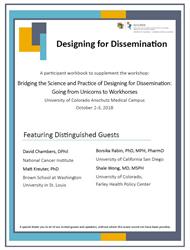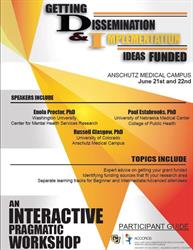Guides & Tools
Activity Based Costing pilot project
By engaging rural primary care clinic partners, we developed and tested a cost collection template that captures time increments for work done around our shared decision-making work in lung cancer screening and smoking cessation. A future guidebook will replace this costing template to aid in the entire process. This is to be used as a place to start and modified based on the project and the context. The process map (example for lung cancer screening linked here) was created first with implementers to establish which activities needed to be included in the template. Please check back for the entire guidebook.
Shared Decision-Making for Lung Cancer Screening and Smoking Cessation Tool
In partnership with the Colorado Implementation Science Center for Cancer Control, we have developed, implemented and evaluated a pragmatic intervention aligned with the CMS coverage criteria (SDM and smoking cessation strategies) in four rural primary care clinics to improve the value of LCS
Click HERE for the SDM for LCS tool
Click HERE for the e-learning module (directions below)
To access the Microcertification training to deliver lung cancer screening in primary care and obtain free Continuing Medical Education credit:
1. Click on the “Register” link and a pop-up box will appear; enter your email address and set up your password.
2. Your registration code is: lunghealth (note: this is not case sensitive)
3. You will then be redirected to “My Account” page where you can access the eLearning modules related to lung cancer screening and shared decision making.
Costing Annotated Bibliography of Key Economic Analysis Resources Especially Relevant for Implementation Science
Resource Developed by the UC San Diego DISC and the ACCORDS D&I Program (with help from the COISC3).
RE-AIM Dimensions Checklist
This checklist can be used to identify the number of RE-AIM dimensions a study includes. This may be useful for designing one’s study and reviewing the literature.
Data Science to Patient Value (D2V) resource
DICE Methods website
Rating & Scoring
Rating forms to use for systematic review articles with a goal to promote intervention dissemination and implementation:
Rating both pragmatism and effectiveness to identify evidence-based interventions with strong dissemination potential
Weblink materials developed and supported by the Dissemination and Implementation Science (D&I) team at the University of Colorado Adult and Child Consortium for Outcomes Research and Delivery Science (ACCORDS)
Welcome to this list of resources for authors of systematic reviews. If the systematic review that you will author is meant to identify interventions for translation into real-world systems, then the resources on this website may be of great assistance to you. This website includes resources for rating both the pragmatism and effectiveness of interventions, in order to identify evidence-based interventions with strong dissemination potential.
Scoring guides:
1. The first scoring guide was utilized for a systematic review of eHealth interventions for cancer prevention, and includes measures of pragmatism from the PRECIS framework and other factors related to external validity from the Reach, Effectiveness, Adoption, Implementation, Maintenance (RE-AIM) framework, as published by Sanchez MA, Rabin BA, Gaglio B, Henton M, Elzarrad MK, Purcell P, et al. A systematic review of eHealth cancer prevention and control interventions: new technology, same methods and designs? Transl Behav Med. 2013;3(4):392-401.
Click Here for the Scoring Guide
Click Here to Read the Article
2. The second scoring guide was adapted from the first guide, but used PRECIS-2 framework assessments instead of PRECIS assessments, as the PRECIS-2 had been developed in the intervening time period. This review was also published: Luoma KA, Leavitt IM, Marrs JC, Nederveld AL, Regensteiner JG, Dunn AL, et al. How can clinical practices pragmatically increase physical activity for patients with type 2 diabetes? A systematic review. Transl Behav Med. 2017: doi:10.1007/s13142-017-0502-4. [epub ahead of print].
Click Here for the Scoring Guide
Click Here to Read the Article
We share these resources as open-access, for others who would like to assess pragmatism and effectiveness in systematic reviews. Individuals should attribute these citations if they are adapting these measures of pragmatism to the content of their systematic review. Scientists with questions about how to adapt these guides for their population may contact Dr. Amy Huebschmann of the ACCORDS D&I team at [email protected].
Local Conference Workbooks
Getting D&I Ideas Funded Workbook
> Download the Participant Guide and Workbook

Designing for Dissemination Workshop Workbook
Bridging the Science and Practice of Designing for Dissemination: Going from Unicorns to Workhorses
